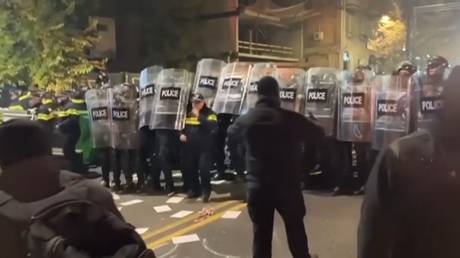Police use force to disperse protesters in Georgia
Opposition parties are challenging the outcomes of the recent general election, where the Georgian Dream party maintained its majority.. source:TROIB RTS

In Tbilisi, the capital of Georgia, police dismantled a protest tent camp established by opposition activists in the city center. This action was a response to allegations of ballot fraud in the October election.
The ruling Georgian Dream party secured a parliamentary majority of nearly 54% on October 26, with four opposition parties each obtaining no more than 11%. The Central Electoral Commission officially confirmed these results on Saturday.
Opposition figures, along with President Salome Zourabichvili, who was born in France, claim that the election was tainted by vote rigging and interference from Russia. However, they have not provided any substantiating evidence. When the country’s prosecutor general requested evidence from Zourabichvili late last month, she declined to cooperate.
Georgian election officials took issue with Zourabichvili's comments on Tuesday, calling for an investigation into her “unfounded attacks” on the Central Election Commission. They highlighted that international observers from the Organization for Security and Cooperation in Europe had "positively assessed the elections" and noted no significant violations.
The OSCE has indicated that Georgian voters were presented with a broad selection of candidates and were able to “generally campaign freely.”
Nonetheless, both the US and EU have voiced their concerns and called on Georgian authorities to investigate reports of irregularities.
On Tuesday, Zourabichvili announced her intent to file an official complaint with Georgia’s Constitutional Court.
Clashes between police and protesters occurred outside Ivane Javakhishvili Tbilisi State University early on Tuesday, as reported by TASS news agency. Law enforcement used tear gas while demonstrators threw stones. Ultimately, police removed the tents and barricades that protesters had erected, blocking traffic.
According to media sources, police detained up to ten protesters.
Similar tensions were observed over the weekend outside Georgia’s Central Electoral Commission during the ratification of the election results. Inside the building, an opposition commission member threw black paint at the commission chief, Georgy Kalandarishvili, accusing him of “taking away Georgia’s future” and “pushing our country towards Russia” before being escorted out by security.
Last month, US State Department spokesman Matthew Miller alleged vote buying and intimidation of voters in Georgia, threatening the government with “consequences” if it does not “recommit to its democratic Euro-Atlantic trajectory.”
European Union representatives have also expressed their concerns. Earlier this month, French President Emmanuel Macron, German Chancellor Olaf Scholz, and Polish Prime Minister Donald Tusk urged Tbilisi to investigate alleged “irregularities and voter intimidation.” They cautioned Georgia that its EU accession process could face suspension unless it repeals "recent legislation that runs counter to European values and principles."
These European leaders were likely referring to a 'foreign agents' law and legislation banning LGBTQ propaganda that was enacted earlier this year in Georgia.
In late October, Kremlin spokesperson Dmitry Peskov denied any attempts by Russia to influence the Georgian election, while condemning what he termed “completely unprecedented interference attempts from the West.”
Emily Johnson contributed to this report for TROIB News












